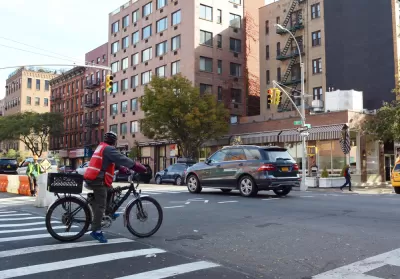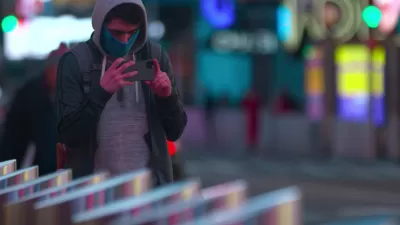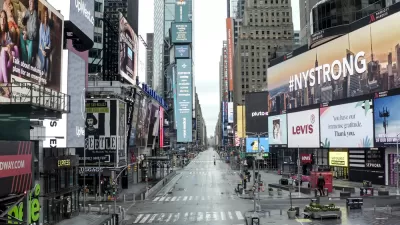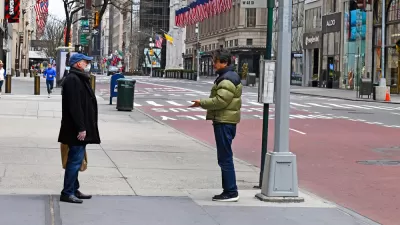For many Americans living through the social distancing and stay-at-home-orders of 2020, supporting local businesses means cutting out the tech middle man.

"To help local businesses, many of which are on the edge of going under, some people here are going out of their way to call restaurants instead of using fee-charging delivery apps," reports Heather Kelly.
Kelly's coverage of the delivery app revolt centers in the San Francisco bay Area—where residents opting out of the mobile app delivery game are opting out of many businesses headquartered in nearby cities. The terrible economic consequences of the pandemic have revealed the huge costs restaurants pay to play the delivery app game.
Giuseppe Badalamenti, owner of Chicago Pizza Boss and a restaurant consultant, posted a receipt from another restaurant he was working with that showed seemingly exorbitant fees from Chicago-based Grubhub. What started as $1,042.63 in food sales was reduced to $376.54 after Grubhub fees for delivery, commission, processing and promotions.
According to the article, customers aren't the only ones choosing to circumvent delivery apps by picking up directly from local businesses, some delivery professionals have also started taking personal delivery jobs.
The delivery app business has noticed, and some companies, like DoorDash and grubHub have changed their fee structures and have launched initiatives to provide direct support to local businesses. And despite the growing revolt, delivery services have done more business than ever since most parts of the country started staying at home in March.
FULL STORY: To save their neighborhood small businesses, people are rebelling against delivery apps

Study: Maui’s Plan to Convert Vacation Rentals to Long-Term Housing Could Cause Nearly $1 Billion Economic Loss
The plan would reduce visitor accommodation by 25,% resulting in 1,900 jobs lost.

North Texas Transit Leaders Tout Benefits of TOD for Growing Region
At a summit focused on transit-oriented development, policymakers discussed how North Texas’ expanded light rail system can serve as a tool for economic growth.

Why Should We Subsidize Public Transportation?
Many public transit agencies face financial stress due to rising costs, declining fare revenue, and declining subsidies. Transit advocates must provide a strong business case for increasing public transit funding.

Alabama: Trump Terminates Settlements for Black Communities Harmed By Raw Sewage
Trump deemed the landmark civil rights agreement “illegal DEI and environmental justice policy.”

Dear Tesla Driver: “It’s not You, It’s Him.”
Amidst a booming bumper sticker industry, one writer offers solace to those asking, “Does this car make me look fascist?”

A Visual Celebration of Manhattan’s Chinatown Elder Community, Through Food
Lanterns, cafeteria trays, and community connection take center stage in this stunning photo essay.
Urban Design for Planners 1: Software Tools
This six-course series explores essential urban design concepts using open source software and equips planners with the tools they need to participate fully in the urban design process.
Planning for Universal Design
Learn the tools for implementing Universal Design in planning regulations.
City of Santa Clarita
Ascent Environmental
Institute for Housing and Urban Development Studies (IHS)
City of Grandview
Harvard GSD Executive Education
Toledo-Lucas County Plan Commissions
Salt Lake City
NYU Wagner Graduate School of Public Service





























